Drug Catalog - Product Detail
ROSUVASTATIN CALCIUM 5MG TB 90
| NDC | Mfr | Size | Str | Form |
|---|---|---|---|---|
| 16729-0284-15 | ACCORD HEALTHCARE | 90 | 5MG | TABLET |
PACKAGE FILES
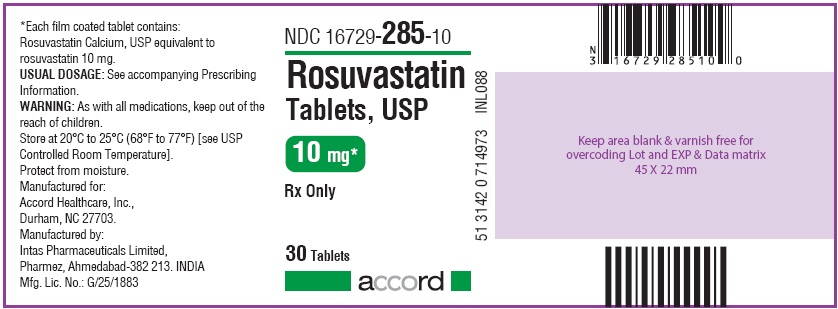
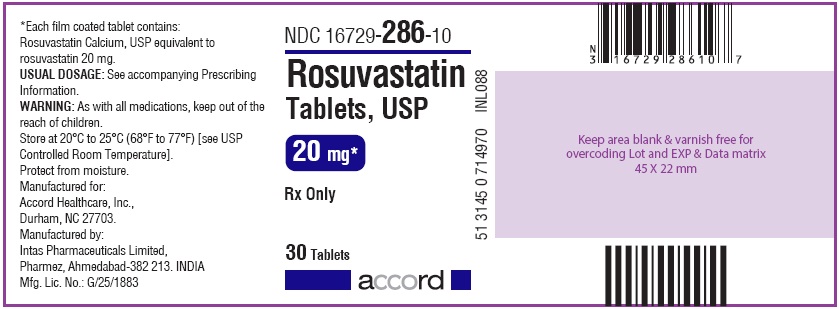
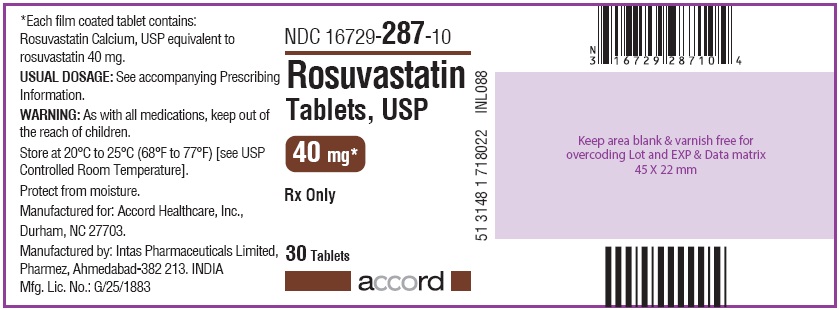
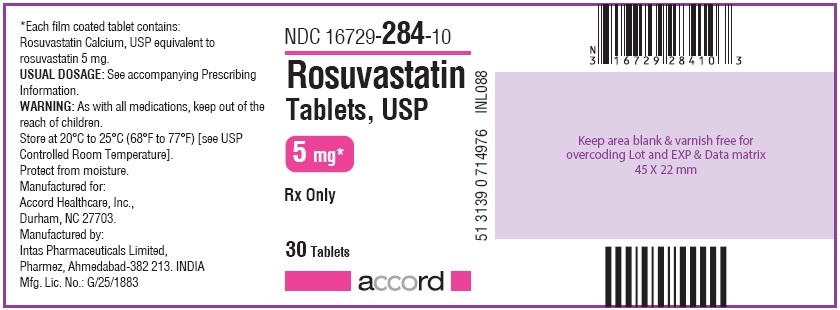
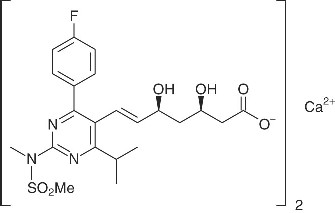



Generic Name
ROSUVASTATIN
Substance Name
ROSUVASTATIN CALCIUM
Product Type
HUMAN PRESCRIPTION DRUG
Route
ORAL
Application Number
ANDA206434
Description
11 DESCRIPTION Rosuvastatin is a 3-hydroxy-3-methylglutaryl coenzyme A (HMG CoA)-reductase inhibitor. The chemical name for rosuvastatin calcium is bis[(E)-7-[4-(4-fluorophenyl)-6-isopropyl-2- [methyl(methylsulfonyl)amino] pyrimidin-5-yl](3R,5S)-3,5-dihydroxyhept-6-enoic acid] calcium salt with the following structural formula: The empirical formula for rosuvastatin calcium is (C 22 H 27 FN 3 O 6 S) 2 Ca and the molecular weight is 1,001.14. Rosuvastatin calcium is a white amorphous powder that is sparingly soluble in water and methanol, and slightly soluble in ethanol. Rosuvastatin calcium is a hydrophilic compound with a partition coefficient (octanol/water) of 0.13 at pH of 7.0. Rosuvastatin tablets, USP for oral administration contain rosuvastatin 5 mg, 10 mg, 20 mg, or 40 mg (equivalent to 5.2 mg, 10.4 mg, 20.8 mg, and 41.6 mg rosuvastatin calcium) and the following inactive ingredients: For 5 mg: Each film coated tablet contains: microcrystalline cellulose, lactose monohydrate, anhydrous lactose, crospovidone, magnesium oxide, magnesium stearate, hypromellose, triacetin, titanium dioxide, and ferric oxide yellow. For 10, 20 and 40 mg: Each film coated tablet contains: microcrystalline cellulose, lactose monohydrate, anhydrous lactose, crospovidone, magnesium oxide, magnesium stearate, hypromellose, triacetin, titanium dioxide, FD & C yellow No. 6, FD & C red No. 40, and FD & C blue No.1. Rosuvastatin tablets, USP meet USP Dissolution Test 2. strucural formula
How Supplied
16 HOW SUPPLIED/STORAGE AND HANDLING Rosuvastatin tablets, USP are supplied as: Strength How Supplied NDC Tablet Description 5 mg Bottle of 30 tablets with a child-resistant closure 16729-284-10 Yellow, round, biconvex, film-coated tablet, debossed “5” on one side and “FI” on other side Bottle of 90 tablets with a child-resistant closure 16729-284-15 Bottle of 1000 tablets 16729-284-17 10 mg Bottle of 30 tablets with a child-resistant closure 16729-285-10 Pink, round, biconvex, film-coated tablet, debossed “10” on one side and “R” on other side Bottle of 90 tablets with a child-resistant closure 16729-285-15 Bottle of 1000 tablets 16729-285-17 20 mg Bottle of 30 tablets with a child-resistant closure 16729-286-10 Pink, round, biconvex, film-coated tablet, debossed “20” on one side and “R” on other side Bottle of 90 tablets with a child-resistant closure 16729-286-15 Bottle of 1000 tablets 16729-286-17 40 mg Bottle of 30 tablets with a child-resistant closure 16729-287-10 Pink, oval, biconvex, film-coated tablet, debossed “40” on one side and “R” on other side Bottle of 90 tablets with a child-resistant closure 16729-287-15 Bottle of 1000 tablets 16729-287-17 Storage Store at 20ºC to 25ºC (68ºF to 77ºF); excursions permitted between 15°C and 30°C (59°F and 86°F) [see USP Controlled Room Temperature]. Protect from moisture.
Indications & Usage
1 INDICATIONS AND USAGE Rosuvastatin tablets are indicated: To reduce the risk of ,major adverse cardiovascular (CV) events (CV death, nonfatal myocardial infarction, nonfatal stroke, or an arterial revascularization procedure) in adults without established coronary heart disease who are at increased risk of CV disease based on age, high-sensitivity C-reactive protein (hsCRP)≥2 mg/L, and at least one additional CV risk factor. As an adjunct to diet to: Reduce low-density lipoprotein cholesterol (LDL-C) in adults with primary hyperlipidemia. Reduce LDL-C and slow the progression of atherosclerosis in adults. Reduce LDL-C in adults and pediatric patients aged 8 years and older with heterozygous familial hypercholesterolemia (HeFH). As an adjunct to other LDL-C-lowering therapies, or alone if such treatments are unavailable, to reduce LDL-C in adults and pediatric patients aged 7 years and older with homozygous familial hypercholesterolemia (HoFH). As an adjunct to diet for the treatment of adults with: Primary dysbetalipoproteinemia. Hypertriglyceridemia. Rosuvastatin tablets are an HMG Co-A reductase inhibitor (statin) indicated: To reduce the risk of major adverse cardiovascular (CV) events (CV death, nonfatal myocardial infarction, nonfatal stroke, or an arterial revascularization procedure) in adults without established coronary heart disease who are at increased risk of CV disease based on age, high-sensitivity C-reactive protein (hsCRP) ≥2 mg/L, and at least one additional CV risk factor. As an adjunct to diet to: reduce LDL-C in adults with primary hyperlipidemia. reduce LDL-C and slow the progression of atherosclerosis in adults. reduce LDL-C in adults and pediatric patients aged 8 years and older with heterozygous familial hypercholesterolemia (HeFH). As an adjunct to other LDL-C-lowering therapies, or alone if such treatments are unavailable, to reduce LDL-C in adults and pediatric patients aged 7 years and older with homozygous familial hypercholesterolemia (HoFH). As an adjunct to diet for the treatment of adults with: Primary dysbetalipoproteinemia. Hypertriglyceridemia.
Dosage and Administration
2 DOSAGE AND ADMINISTRATION Take orally with or without food, at any time of day. (2.1) Assess LDL-C when clinically appropriate, as early as 4 weeks after initiating rosuvastatin tablets, and adjust dosage if necessary. (2.1) Adults: Recommended dosage range is 5 to 40 mg once daily. (2.1) Pediatric Patients with HeFH: Recommended dosage range is 5 to 10 mg once daily for patients aged 8 to less than 10 years of age, and 5 to 20 mg once daily for patients aged 10 years and older. (2.2) Pediatric Patients with HoFH: Recommended dosage is 20 mg once daily for patients aged 7 years and older. (2.2) Asian Patients: Initiate at 5 mg once daily. Consider risks and benefits of treatment if not adequately controlled at doses up to 20 mg once daily. (2.4) Patients with Severe Renal Impairment (not on hemodialysis): Initiate at 5 mg once daily; do not exceed 10 mg once daily.(2.5) See full prescribing information for rosuvastatin tablets dosage and administration modifications due to drug interactions. (2.6) 2.1 General Dosage and Administration Information Administer rosuvastatin tablets orally as a single dose at any time of day, with or without food. Swallow the tablets whole. Assess LDL-C when clinically appropriate, as early as 4 weeks after initiating rosuvastatin tablets, and adjust the dosage if necessary. If a dose is missed, advise patients not to take an extra dose. Resume treatment with the next dose. When taking rosuvastatin tablets with an aluminum and magnesium hydroxide combination antacid, administer rosuvastatin tablets at least 2 hours before the antacid [see Drug Interactions (7.2)]. 2.2 Recommended Dosage in Adult Patients The dosage range for rosuvastatin tablet is 5 to 40 mg orally once daily. The recommended dose of rosuvastatin tablets depends on a patient’s indication for usage, LDL- C, and individual risk for CV events. 2.3 Recommended Dosage in Pediatric Patients Dosage in Pediatric Patients 8 Years of Age and Older with HeFH The recommended dosage range is 5 mg to 10 mg orally once daily in patients aged 8 years to less than 10 years and 5 mg to 20 mg orally once daily in patients aged 10 years and older. Dosage in Pediatric Patients 7 Years of Age and Older with HoFH The recommended dosage is 20 mg orally once daily. 2.4 Dosing in Asian Patients Initiate rosuvastatin tablets at 5 mg once daily due to increased rosuvastatin plasma concentrations. Consider the risks and benefits ofrosuvastatin tablets when treating Asian patients not adequately controlled at doses up to 20 mg once daily [see Warnings and Precautions (5.1) , Use in Specific Populations (8.8) , and Clinical Pharmacology (12.3) ]. 2.5 Recommended Dosage in Patients with Renal Impairment In patients with severe renal impairment (CLcr less than 30 mL/min/1.73 m 2 ) not on hemodialysis, the recommended starting dosage is 5 mg once daily and should not exceed 10 mg once daily [see Warnings and Precautions (5.1) and Use in Specific Populations (8.6) ]. There are no dosage adjustment recommendations for patients with mild and moderate renal impairment. 2.6 Dosage Modifications Due to Drug Interactions Table 1 displays dosage modifications for rosuvastatin tablets due to drug interactions [see Warnings and Precautions (5.1) and Drug Interactions (7.1) ]. Table 1: Rosuvastatin Tablets Dosage Modifications Due to Drug Interactions Concomitantly Used Drug Rosuvastatin Tablets Dosage Modifications Cyclosporine Do not exceed 5 mg once daily. Teriflunomide Do not exceed 10 mg once daily. Enasidenib Do not exceed 10 mg once daily. Capmatinib Do not exceed 10 mg once daily. Fostamatinib Do not exceed 20 mg once daily. Febuxostat Do not exceed 20 mg once daily. Gemfibrozil Avoid concomitant use. If used concomitantly, initiate at 5 mg once daily and do not exceed 10 mg once daily. Tafamidis Avoid concomitant use. If used concomitantly, initiate at 5 mg once daily and do not exceed 20 mg once daily. Antiviral Medications Sofbuvir/velpatasvir/voxilaprevir Ledipasvir/sofosbuvir Concomitant use not recommended. Simeprevir Dasabuvir/ombitasvir/paritaprevir/ritonavir Elbasvir/Grazoprevir Sofosbuvir/Velpatasvir Glecaprevir/Pibrentasvir Atazanavir/Ritonavir Lopinavir/Ritonavir Initiate at 5 mg once daily. Do not exceed 10 mg once daily. Darolutamide Do not exceed 5 mg once daily. Regorafenib Do not exceed 10 mg once daily.
